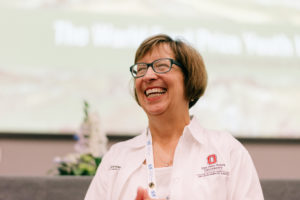Engaging the Next Generation of Global Hunger Fighters
July 13, 2017
Ending hunger is the single greatest challenge we face on the planet today.
World Food Prize Youth Institute (WFP-YI) is an exemplary model of how 4-H can engage and empower youth as global citizens. Its mission is to find a way to feed the nine billion people who will share this planet by 2050. Its programs provide opportunities for youth to engage with experts and tackle challenges to global food security while learning valuable career and life skills.
At today’s workshop at the 2017 Global 4-H Network Summit, delegates heard about exciting opportunities for young people to step in and lead a new wave of agriculture and food systems that is more aligned than ever before with social, health and environmental interests.
“I’ve been continually inspired by the remarkable level of young people’s enthusiasm for education and activism tied to farming, food and social justice,” said Libby Crimmings, program director, `World Food Prize. “It’s so important to harness the enthusiasm of these emerging leaders and support their empowerment by creating opportunities for skills and training to be global hunger fighters.”
 Brian Wibby and Makena Schultz, both educators at Michigan State University Extension, and Sally McClaskey, 4-H youth program manager at Ohio State University presented with Crimmings.
Brian Wibby and Makena Schultz, both educators at Michigan State University Extension, and Sally McClaskey, 4-H youth program manager at Ohio State University presented with Crimmings.
“I’ll often hear youth say they want to make a difference in the world, but aren’t sure where to start,” said Schultz. “For those interested in the big issues and making a big difference, the Institute provides a unique opportunity to explore global issues and make recommendations for addressing them.”
Through its program, youth write a research paper from topics directly connected to agriculture and the food chain, to broader themes connected to the United Nations Sustainable Development Goals (SDGs).
Earlier this week, a UN political forum opened with a focus on ending poverty and forming partnerships. The High-Level Political Forum is taking place July 10 to 19 at UN Headquarters in New York to track progress on the 17 SDGs, two years after they were adopted.
The SDGs span the whole range of policy areas and aim to tackle contemporary global challenges by 2030. More than any other sector, agriculture and food are the common threads that tie the 17 SDGs together.
SDG #1 focuses on poverty reduction, where agriculture and food has a key role to play. SDG #2 calls specifically to: “end hunger, achieve food security and improved nutrition and promote sustainable agriculture.”
Feeding a growing world population with a nutritious diet is a profound challenge that will require the best of science, policy, business, the arts and civil society working together.
“Young people with different talents and skills can help feed the world,” said Crimmings. “We’re recognizing the importance of finally engaging young people in critical conversations about the world’s most wicked of problems.”
Each year, around 200 exceptional high school students from across the United States and other countries participate in the Global Youth Institute hosted by the World Food Prize Foundation
Back To Blog